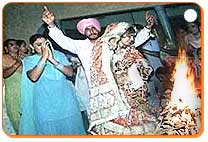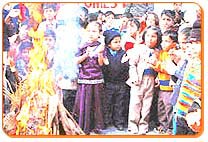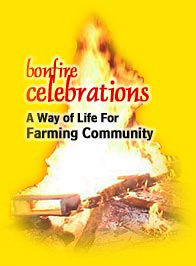Dulha Bhatti

Dulha Bhatti also popularly known as Robinhood is the heroic icon that is associated with the harvest festival of Lohri. The legendary figure of Dulha Bhatti represents the glorious secular tradition of Lohri festival. Centuries gone by, rulers of Delhi controlled large parts of the fertile province of Punjab. Due to weak governments at Delhi, there was a perennial flow of hordes of invaders from Afghanistan, Central Asia, Persia, Greece and Asia Minor through the Khyber Pass into the sub-continent and the people of Punjab always had to bear the maximum brunt of their pilferage, loot and plunder.
There is a vast tract of semi-arid region lying between rivers Chenab and Ravi, which now falls in the districts of Sheikhupura and Faislabad, called the Saandal Bar. The people of this area were known to provide stiffest opposition to marauders. The Mahmud of Ghaznawi had carried out one special campaign to subdue the burly and bold Virk Jatts, Gurjars and Bhatti Rajputs of Saandal Bar. Even Babur makes a mention of the resistance offered to him by these chivalrous people in his autobiography ‘Baburnama.’ From a social point of view these valiant tribesmen had a very secular outlook and their lifestyle was a composite blend of Hindu and Islamic rituals and traditions. In due course of time, the Mughals had consolidated their hold over the entire country but dominance of the region lying between the Chenab and Ravi, eluded them. People of this area never paid any taxes rather they openly defied the authorities and indulged in looting the royal caravans and treasures.
‘Saandal’, a warlord of Bhatti Rajput clan led these tribals. He openly rebelled against the Mughal Imperialism. Prince Jahangir, the heir apparent fired with zeal to prove his prowess carried out campaigns to consolidate the Mughal authority in the region. There were many skirmishes in which Saandal and his son Farid were captured and executed. Their skins were peeled from dead bodies, filled with chaff and hanged at the Delhi gate of the Fort of Lahore to instill a sense of fear amongst the rebels.

However, son of Farid, Abdullah or Dullah as he is fondly called remained unfazed and continued his defiant activities. Dullah earned notoriety in the eyes of authorities. He looted wealthy landlords and Imperial officers and distributed the booty amongst the poor. Dullah enjoyed huge popularity amidst the poor tribal folks of the area. He came to be regarded as a father figure for the distressed and oppressed. He became a living embodiment of the chivalrous and secular, socio-cultural character of the region.
There are hundreds of traditions associated with this legendary figure in Punjab, the most significant of them being the one, which evolved around the Festival of Lohri. The medieval folklore relates the celebration of Lohri to the legendary figure of Dullah, who was the contemporary of yet another Super Human, Poet Divine, Sri Guru Arjan Dev, the Fifth Master, who sacrificed his life at the altar of humanity at Lahore.
It is believed that Dullah had restored the prestige of an innocent girl whose modesty was outraged by a wealthy Zimindar. There are various versions of the actual story. Some traditions say that Dullah had adopted this girl as his daughter and arranged her marriage in the Jungles of ‘Saandal Bar’. As there was no priest nearby to chant the Vedic Hymns and solemnise the marriage Dullah had lit a bonfire and composed an impromtu song, “Sunder Mundriye Tera Kaun Vichara ! Dullah Bhatti Wala Ho! Dullaeh Di Teeh Viahi Ho! Ser Shakar Payi !” The bride and the groom were asked to take pheras of the bonfire as Dullah sang this hilarious song.
Yet another tradition says he had safely rescued a poor girl from the clutches of a Mughal general and later arranged her marriage. Later on people collectively composed this Lohri song in honor of his chivalrous deed. Dullah Bhatti sacrificed his life fighting the Mughals, in one of the battles.
Harvest Festival of Punjab | Origin of Lohri | Legends of Lohri | Customs and Traditions | History of Lohri | Influence of Lohri | Dulha Bhatti | Lohri Calendar




